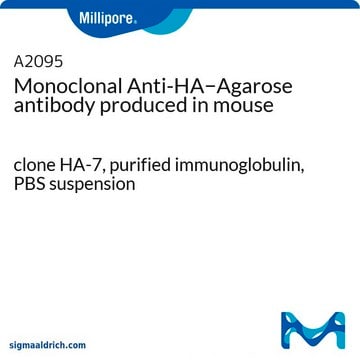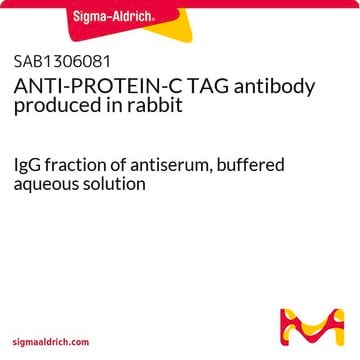11815016001
Roche
Anti-HA Affinity Matrix
from rat IgG1
Synonym(s):
affinity matrix, anti-ha
About This Item
Recommended Products
biological source
rat
Quality Level
conjugate
agarose conjugate
antibody form
purified immunoglobulin
antibody product type
primary antibodies
clone
3F10, monoclonal
form
slurry
packaging
pkg of 1 mL (settled resin volume)
manufacturer/tradename
Roche
isotype
IgG1
epitope sequence
YPYDVPDYA
capacity
2-8 nmol/mL binding capacity
storage temp.
2-8°C
General description
Specificity
Immunogen
Application
- Western blotting using the Anti-HA antibody
- Silver staining (or similar protein stain)
- In coimmunoprecipitation.
- Immunoprecipitation of HA-tagged proteins from mammalian, bacterial, and yeast cell extracts
- Affinity column purification of HA-tagged proteins from crude protein extracts
Features and Benefits
- Achieve enhanced specificity and reduced cross-reactivity of Anti-HA High Affinity.
- Use nondenaturing conditions for elution of your HA-tagged protein of choice.
- Purify even rarely expressed HA-tagged proteins.
- Highly specific to YPYDVPDYA.
- Suitable for purification of proteins containing HA-epitop as N-terminal, C-terminal or internal fusion.
- Applicable with crued cell extracts from mammalian, bacterial and yeast expression systems.
Quality
Physical form
Analysis Note
Other Notes
Not finding the right product?
Try our Product Selector Tool.
Storage Class Code
12 - Non Combustible Liquids
WGK
WGK 1
Flash Point(F)
does not flash
Flash Point(C)
does not flash
Choose from one of the most recent versions:
Already Own This Product?
Find documentation for the products that you have recently purchased in the Document Library.
Customers Also Viewed
Protocols
To concentrate the protein eluate, Roche recommends following the immunoprecipitation protocol given in the package insert from step 2 to 5. Use 50 μl of resuspended Anti-HA Affinity Matrix in a microcentrifuge tube.
Our team of scientists has experience in all areas of research including Life Science, Material Science, Chemical Synthesis, Chromatography, Analytical and many others.
Contact Technical Service











